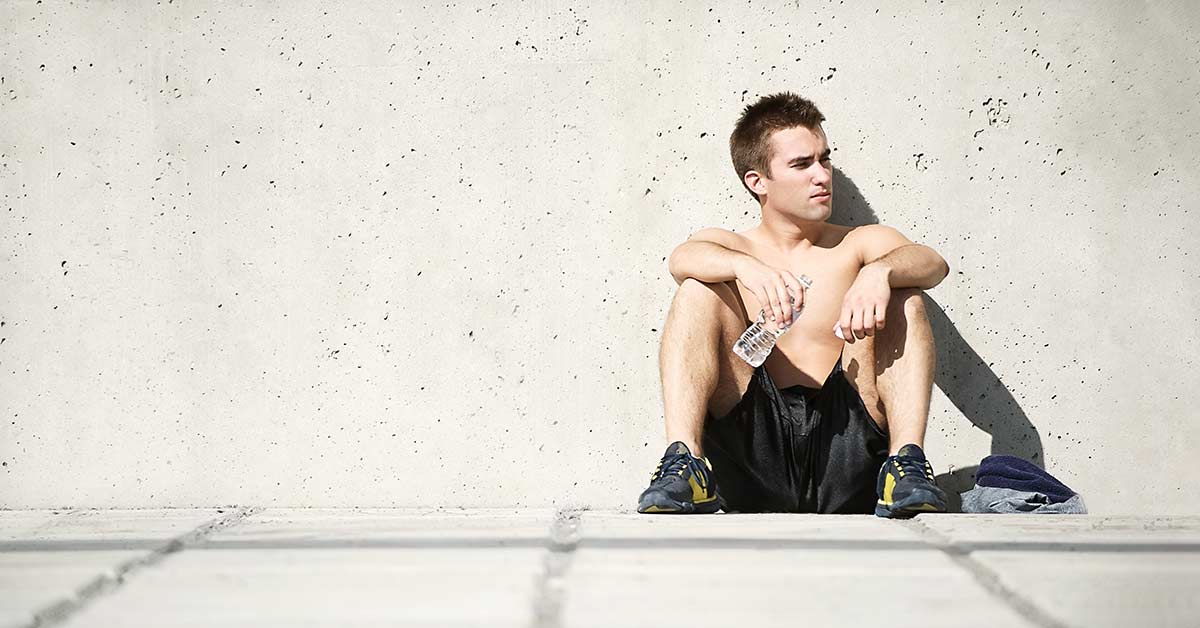
The end of the school year is always a hard time for me. After a long winter, the entire campus is excited about getting outside and enjoying the spring weather. Teachers are wrapping up their classes and everyone is ready to be finished. Athletes are done—or almost done—with their competitive seasons and ready for a break. All of these things make it difficult for everyone to keep their minds right and stay focused on their classes, jobs, and workouts.
There are similarities between an athlete’s summer season and the actual, natural summer season. In nature, summer is the season when all things grow. Farmers plant in the spring and nurture the seedlings until the summer takes over and provides the sun, rain, and warm weather. It’s the summertime that creates the right environment that allows for growth. It works for farmers and it should work for athletes, too.
For most college and high school athletes, summer is the longest stretch of time without having to worry about practice or competitions. Like farmers, athletes can use this time to grow and develop for the fall and the harvest of the competitive season. Before you know it, summer will be here. So here are four pieces of advice to help set you up for massive success.

Set and Keep Your Schedule
This first piece of advice might be the hardest one for young people: You need to keep a consistent schedule. While growing up, I thought that summer was for sleeping in. After a long school year of getting up early to learn, I took advantage of the summer months to stay up late and get up late. All those endless summer days, and many were spent in bed, sleeping.
Do you need to sleep? Of course you do. Sleep is the magic pill that lets your body repair and fix itself. Like all things in nature, there is a rhythm to our bodies and when you constantly change your sleep cycles, your body cannot get into a rhythm. Without that rhythm, it’s difficult for hormones like testosterone and cortisol to stay in their natural relationship. It also means that, with that disrupted rhythm, there is an increased risk for multiple chronic health issues, like diabetes, obesity, and depression.
Athletes need to keep a consistent schedule, even in the summer. This means going to bed and waking up at the same times as the rest of the year, says @CarmenPata. Share on XIf those are the consequences of having an inconsistent schedule, what are the benefits? The biggest benefit I know of is increased time. Getting up just a little earlier gives you time to do your food prep. Or get in a workout. Or read some life-changing advice (like this article). Is getting up early going to be easy? Of course not. All of our beds are comfortable, warm, and inviting.
Once you get in the habit of getting up and out of bed earlier, however, you will be in the company of many successful people. Kobe Bryant was famous for getting up early, going to the gym, and forcing himself to make 400 shots before leaving. The Rock, Dwayne Johnson, brags that he gets two workouts done before other people get out of bed. Tom Brady is up every day between 5:00 and 5:30 a.m.
The take-home message? Keep getting to bed and waking up at the same time every single day. The sooner you start getting up earlier, the sooner you will start separating yourself from your competition.

Plan for Heat Management
What’s the best part of summer? For many people, it’s the weather. The sun is shining, it’s hot outside, and you’re sweating. The heat can help or hinder your training in the summer.
Sure, when it’s hot outside, warm-ups are faster and easier. If you’re just walking to the gym and you’re already sweating, your general warm-up is already done. You have initiated the sweat response, your body temperature has increased, and you might be breathing heavier. In general, your body is ready for activity. Now, you still need a specific warm-up to get yourself ready for the training session goal so you can tap into the potentiation components of a warm-up, but, in a general sense, you are ready to go.
When planning outdoor workouts in the summer, be sure to plan for the heat—especially if you’ve been outside all day for your job, says @CarmenPata. Share on XHere is the trap that people fall into. Because everyone wants to take advantage of every single moment of the perfect summer day, they forget about what the heat can do. Being outside in the heat wears you down. It’s like the slow progress of erosion. Being exposed to higher temperatures over time increases the amount of water lost through sweat. If you need a refresher on the effects of dehydration, here is a nice study to remind you of all the negative effects.
NASA found that when temperatures are over 95 degrees Fahrenheit, people made about 60 mistakes an hour without realizing what they were doing. Why? When the body is hot, more blood is pushed to the surface of the skin to help cool the body. When the heart rate is elevated due to the heat, less blood and all its nutrients go to the brain, organs, and muscles. If NASA astronauts and astronaut hopefuls experience up to 60 mistakes in an hour, how do you think you will hold up doing something very technical like a power clean?
If you are like the athletes I work with, your summer job is likely performed outside. That means you will have to be creative in the way you manage the heat. That might mean working out early in the morning before you’ve been out in the sun all day. That might mean you have to find ways to cool down after work and workouts. If you don’t have air conditioning, go to the library. There, you can hang out in the free air conditioning while learning something new.
If you do have air conditioning, by all means turn it on. A few summers back, we had a house full of athletes who bragged that they hadn’t turned on the air conditioning in their house all summer. When they were talking to me, it was in the middle of a heat wave with high humidity. Those fools were tired because they had not had a restful night’s sleep in more than a week, all because they were too cheap or too proud to turn on the central air. If I’ve learned one thing in my career, it’s that tired athletes only get more tired—they don’t ever get better.

Feed the Machine
Have you ever really thought about why you eat? No, this is not a rhetorical question. Why do you need to eat? It comes down to a few things. You eat because your body needs energy to do work. You eat because your body needs to repair itself. You eat because it’s a social way to connect to someone else. When summer hits, it’s not time to back off of training, and therefore it’s not time to back off of eating quality food.
Here’s the problem. You will have a summer job and there is a good chance that wherever you work, you will be one of the few people working out regularly. Of all the people who actually work out, there are probably very few like you who are training for a specific goal other than exercising for general health. Food for these people has a different meaning.
When summer hits, it’s not time for athletes to back off of training, and therefore it’s not time to back off of eating quality food, says @CarmenPata. Share on XSure, it still gives them energy, but they more often eat for social reasons or out of boredom. This is the problem. We all begin to act like the people we surround ourselves with. If everyone around you goes to eat out at a buffet every day, sooner or later you will be joining them. You might say it will just be one time, but eventually you’ll be doing it every day. Deep fried food might taste great, but is it really going to help you achieve your athletic goals?
Of course not.
Training during the summer needs to be supported with enough quality food. Depending on your summer job, you will have to figure out how best to make sure you are eating the right food. If you are lucky enough to have an office job, then bringing food to work should be easier for you. You’ll probably have a break room with a full-sized refrigerator and microwave that you can use to store and reheat your meals. On the other hand, if you work at a job that requires you to be outside or work in a factory setting, meal prep is going to be more difficult.
Back when I was doing shift work, we had a 15-minute morning break, a 30-minute lunch break, and another 15-minute afternoon break. That’s not a lot of time to get the nourishment your body needs in order for you to perform. In that case, you better have a food option that is quick, fast, and doesn’t need a refrigerator. For me, there is nothing better for those 15-minute breaks than a protein shake. It just so happens that one of my favorite authors has a book, The Hungry Athlete, which can give you some directions on how to do this.

Plan to Work Hard and Play Hard
School’s out for summer. No more pencils… no more books… no more teachers’ dirty looks. School’s out for summer. If there has ever been a theme song for the end of school, it has to be Alice Cooper’s School’s Out. The excitement and tempo of the song perfectly match my emotions at the end of the year, and I’m sure we all can agree that the start of summer is the ultimate form of optimism that we can experience.
We have those summer days that feel like they last forever. We have the weather that makes us want to get outside and play as much as we can. We have the freedom of taking vacations to our favorite places. If you really want to take your training to the next level, it is that last idea that you need to spend some time thinking about.
All good coaches have a year plan that is laid out, where we have scheduled all the important training, including the times we want the athletes to rest. Here is where I see people make a big mistake. The athletes never talk to their coaches about when they are planning to take a vacation. I cannot speak for every strength coach out there, but I WANT my athletes to take breaks. I WANT them to get away for a week with their family or friends. I WANT them to talk to me, so we can plan TOGETHER when they should take time away.
While athletes should take a vacation, they should also talk to their coach to figure out the best time to take it, says @CarmenPata. Share on XWhen I have athletes who decide to take a vacation without talking to me first, they seem to have an unbelievable ability to pick the absolutely wrong time to miss training sessions. Either they are missing the start of a new program and will be lost when they return, or they pick a time where we are getting close to peaking. Then, when they get back, they make the mistake of thinking they can jump back in with everyone else. Unfortunately, their body tells them that they CANNOT jump back in with everyone else, with reminders in the form of pulled muscles, extreme soreness, or depressingly light estimated maxes.
The question is not should you take a vacation, but when should you go on vacation? Of course, there are natural breaks in the summer training block. If you’re in the U.S., the Fourth of July is a natural time where you can plan on a break. There will be other times that you can plan to be away, but you need to be able to talk to your coach. In my view, we all want and need to have vacations, but time away from the weight room is very different than time away from a business setting.
In a professional or business setting, when you are away you will be missed, but there are processes set up to keep things going when you are not physically there. In the weight room, when you are away, of course you will be missed, and people still put in their work when you are not there. But the major difference is that your body is no longer getting the stress of training. That stress from training is the thing that allows you to get better, set new personal records, and become a better version of yourself. So, before you book a trip, have a conversation with your coach about what particular dates you can get away without jeopardizing your training goals.
Final Thoughts
For me, summer is still the highlight of the training year, and those three summer months are the reason I grind through the other nine. In all the years I’ve been working with high school and college athletes, far too many of them have not listened to the advice that you’ve just read. Those students didn’t understand the simple fact that the summer months are the perfect time to grow their potential for success.
The summer months are the perfect time for athletes to grow their potential for success, says @carmenpata. Share on XI describe faith as the ability to see things as they could be, where facts are seeing things the way they are. Looking back, maybe these athletes who didn’t have success just didn’t have faith. Maybe they didn’t have the ability to see the finish line when they were still at the start line. Maybe they didn’t use one of the most powerful and magic words in the human language: “Until.” Until means defining a goal and having the courage to see it though, no matter what. It’s a promise to yourself to do it until you get to where you want to be. Until means they won’t miss the chance to grow, to pay the price, until they’ve found success.
When these athletes have made a decision that they won’t give up until they get there, they move differently. They move with a sense of urgency. They are diligent in everything they do. As it’s been said, diligence is the backbone of good luck. Isn’t it funny how all people who are diligent and hardworking seem to also have all the good luck? Now that you know how to set up yourself for success this summer, go make the most of these perfect months of training.
Since you’re here…
…we have a small favor to ask. More people are reading SimpliFaster than ever, and each week we bring you compelling content from coaches, sport scientists, and physiotherapists who are devoted to building better athletes. Please take a moment to share the articles on social media, engage the authors with questions and comments below, and link to articles when appropriate if you have a blog or participate on forums of related topics. — SF

